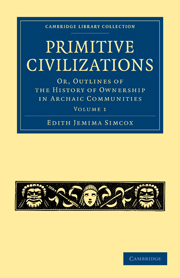Book contents
- Frontmatter
- PREFACE
- Contents
- CHAPTER 1 INTRODUCTION
- CHAPTER II PREHISTORIC PROBLEMS
- BOOK I OWNERSHIP IN EGYPT
- BOOK II ANCIENT BABYLONIA
- CHAPTER I SUMERIAN CIVILIZATION
- CHAPTER II BABYLONIAN CHRONOLOGY
- CHAPTER III THE ANCIENT CITIES OF SUMER AND AKKAD
- CHAPTER IV BABYLONIA AND ASSYRIA
- CHAPTER V COMMERCIAL LAW AND CONTRACT TABLETS
- CHAPTER VII DOMESTIC RELATIONS AND FAMILY LAW
- BOOK III FROM MASSALIA TO MALABAR
CHAPTER II - BABYLONIAN CHRONOLOGY
Published online by Cambridge University Press: 07 September 2011
- Frontmatter
- PREFACE
- Contents
- CHAPTER 1 INTRODUCTION
- CHAPTER II PREHISTORIC PROBLEMS
- BOOK I OWNERSHIP IN EGYPT
- BOOK II ANCIENT BABYLONIA
- CHAPTER I SUMERIAN CIVILIZATION
- CHAPTER II BABYLONIAN CHRONOLOGY
- CHAPTER III THE ANCIENT CITIES OF SUMER AND AKKAD
- CHAPTER IV BABYLONIA AND ASSYRIA
- CHAPTER V COMMERCIAL LAW AND CONTRACT TABLETS
- CHAPTER VII DOMESTIC RELATIONS AND FAMILY LAW
- BOOK III FROM MASSALIA TO MALABAR
Summary
Discoveries made within the last decade have led the students of the earliest monuments of Babylonia to claim for the kingdoms of Sumer and Akkad an earlier date than even that assigned for the foundation of the Egyptian monarchy. Indeed, it is clear that Euphratic civilization must have been the elder, if the ancestors of the Egyptians proceeded from Western Asia to the Nile Valley, and if the civilization established in the region they quitted was not brought back by a returning stream of immigration from Egypt.
To the general resemblances noted in the earliest monuments of Egypt and Babylonia, Professor Hommel has lately added a remarkable list of coincidences of name and meaning in some of the most ancient divinities and towns of the two countries. Eridu, the seat of the primæval worship of Ea, in its earliest form Urru- (or Gurru-) dugga, means “city of the good” (sc. god), while the name of Memphis (Men-nofer), commonly rendered “good city,” is susceptible of the same reading as that of Eridu. At some still earlier period Eridu is called Nun-ki, the place of Nun, the god of the heavenly ocean, which it is possible further to identify with the later name of the god Anu, on the one hand, and with the Egyptian Nun on the other.
- Type
- Chapter
- Information
- Primitive CivilizationsOr, Outlines of the History of Ownership in Archaic Communities, pp. 252 - 260Publisher: Cambridge University PressPrint publication year: 2010First published in: 1894



